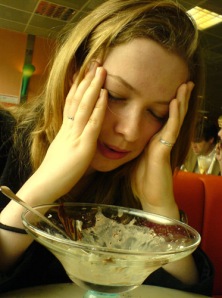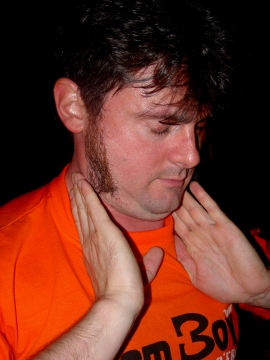If you’ve been in a child therapist’s office, you’ve seen posters illustrating basic emotions – joy, terror, humiliation, etc. Research using photos of such broadly-expressed feelings has shown those with schizophrenia and autism struggle partly due to difficulty identifying others’ emotions. At the University of Cardiff, Kirsten McEwan and her research team investigated people’s responses to photos of more-understated sentiments. They’ve found that highly self-critical people may have subtler difficulties recognizing a subtler emotion: compassion. Embed from Getty Images
McEwan, et al began by photographing actors they’d asked to express ‘social emotions’, such as sympathy, embarrassment or a critical attitude. They kept or discarded images for future research, based on whether their first group of study subjects could consistently agree on the emotion shown.
They asked their second group of study subjects to watch the images on a screen, and press a button whenever a dot appeared. Such “computer visual probe tests” give clues to a person’s attention: the farther their eyes are from the dot, the longer they take to press the button. McEwan, et al separated their study participants into two groups: those who were highly self-critical and those who were no tougher on themselves than average. They found that those in the average category were quicker to respond when a compassionate face was replaced by a dot. Those who were higher in self-criticism took just as long or longer – suggesting they were less attentive to supportive expressions.
High self-criticism is a common aspect of depression. While our depressed clients tell us, “Nobody cares,” their friends and family may well be wondering, “Can’t they see how worried we are? That we’re all here for them?” McEwan, et al’s data shows the answer, to an extent, may be, “No. They can’t.”
Afterthought:
Therapists in private practice may want to consider the researchers’ comments about beaming faces:
“Recent research suggests the ‘full-smile’ of a happy/joyful face can actually be aversive, and processed as a threat by some individuals. Schultheiss and colleagues (2005, 2007) suggest that this is because some types of smile – especially broad smiles – communicate social dominance; hence, smiles can be aversive.”
Psychology Today‘s “Find a Therapist” site is a parade of clinicians grinning like lottery winners. Our photos may draw more clients if our expressions say, “Compassionate, gently-concerned clinician,” more, and “The cat who ate the canary,” less.
Citation:
McEwan K, Gilbert P, Dandeneau S, Lipka S, Maratos F, et al. (2014) Facial Expressions Depicting Compassionate and Critical Emotions: The Development and Validation of a New Emotional Face Stimulus Set. PLoS ONE 9(2): e88783. doi:10.1371/journal.pone.0088783
@ 2014 Jonathan Miller All Rights Reserved








